

Nik Cubrilovic Blog - HowTo: Setup secure and private Facebook browsing. This howto guide will take you through securing your Facebook account, enable settings for improved privacy, disabling features where your Facebook information can be shared with third-party sites, and finally setting up your browser for private sharing Step 1.
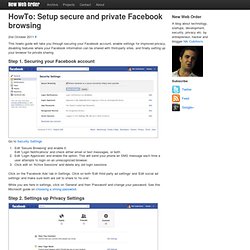
Securing your Facebook account Go to Security Settings Edit 'Secure Browsing' and enable it.Edit 'Login Notifications' and check either email or text messages, or both Edit 'Login Approvals' and enable the option. This will send your phone an SMS message each time a user attempts to login on an unrecognized browser.Click edit on 'Active Sessions' and delete any old login sessions Click on the 'Facebook Ads' tab in Settings.
Disconnect. Nik Cubrilovic Blog - Facebook Fixes Logout Issue, Explains Cookies. I wrote a post two days ago about privacy issues with the Facebook logout procedure which could lead to your subsequent web requests to third-party sites that integrate Facebook widgets being identifiable and linked back to your real account.
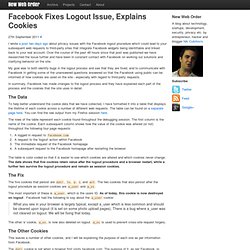
Over the course of the past 48 hours since that post was published we have researched the issue further and have been in constant contact with Facebook on working out solutions and clarifying behavior on the site. My goal was to both identify bugs in the logout process and see that they are fixed, and to communicate with Facebook in getting some of the unanswered questions answered so that the Facebook using public can be informed of how cookies are used on the site - especially with regard to third-party requests.
In summary, Facebook has made changes to the logout process and they have explained each part of the process and the cookies that the site uses in detail. The Data The Fix The five cookies that persist are datr, lu, p, L and act. Where Now. Nik Cubrilovic Blog - Logging out of Facebook is not enough. Important Update: Facebook has responded and issued a fix for this issue.
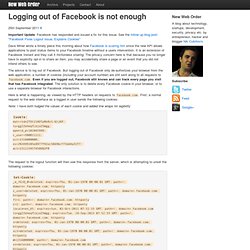
See the follow up blog post "Facebook Fixes Logout Issue, Explains Cookies" Dave Winer wrote a timely piece this morning about how Facebook is scaring him since the new API allows applications to post status items to your Facebook timeline without a users intervention. It is an extension of Facebook Instant and they call it frictionless sharing. The privacy concern here is that because you no longer have to explicitly opt-in to share an item, you may accidentally share a page or an event that you did not intend others to see. The advice is to log out of Facebook. Here is what is happening, as viewed by the HTTP headers on requests to facebook.com. Academize. Hoehn’s Musings. 21 Years Of Making Sense Of The World. A collection of my principles, patterns and values that I’ve figured out in my short time on this planet: Do things like evolution.
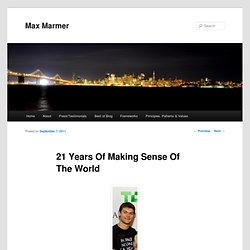
Throw stuff at the wall and see what sticks. Take the best stuff. Iterate. Change is accelerating. You do not truly have free will until you transcend your ego. Surround yourself with amazing people. The only thing constant is change. Feedback is a powerful, life shaping force. You can’t be good at everything. Burning desire is the energy of achievement. Be proactive about what you want. Don’t settle. Create a compelling vision of where you want to go and who you want to be. Academia.edu - Follow research. Ten Principles of Good Design. A new space for writers to share, read and sell. LifeEdited. TreeHugger. Graham Hill (GHill) What’s Mine is Yours: The Rise of Collaborative Consumption. DiyFractional.com - Do-it-Yourself Fractional Ownership. VNU Servicio Voluntariado en Línea.
Manual de uso de Google Plus (Google+) El proyecto Google+ (también llamado Google plus o G+) es una nueva red social desarrollada por Google y lanzada al público (mediante invitación) el pasado 28 de junio de 2011.
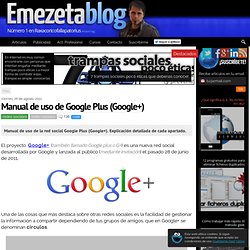
Una de las cosas que más destaca sobre otras redes sociales es la facilidad de gestionar la información a compartir dependiendo de tus grupos de amigos, que en Google+ se denominan círculos. Así pues, cuando publicamos mensajes, fotos o algún tipo de información en Google+, tenemos a nuestra disposición las siguientes opciones: Personas concretas: La información se puede compartir con usuarios individuales o direcciones de email directamente.Tus círculos: La información se comparte sólo con las personas que están dentro de alguno de tus círculos. Al contrario de redes como Facebook (en las que las dos personas deben añadirse mutuamente), Google+ actúa como lo hace Twitter, cada usuario añade a la persona que quiere leer, sin que este tenga que hacer lo mismo. 1.
En Home, actualmente, podemos diferenciar 11 zonas: 1. EduMOOC: Online Learning Today... and Tomorrow. Program and Resources Expanding Daily!
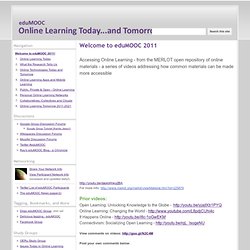
Visit Often for Updates! The gadget spec URL could not be found The Center for Online Learning, Research and Service at the University of Illinois Springfield welcomes you to a Massive Open Online Class (MOOC) on “Online Learning Today...and Tomorrow.” It will continue through August 19. It is totally open, free, and collaborative. El Arte de la Memoria. Watch "TEDxHouston - Roberta B. Ness, MD, MPH - Innovative Thinking: Can You Be Taught?" Video at TEDxTalks. Change.mooc.ca. MOOCs - An overview.
Eye on Learning. Journeys to the Future. Cover Story: Journeys to the Future The blind can see again, diseases like malaria and Alzheimer’s can be cured and storms can be accurately forecast months in advance.
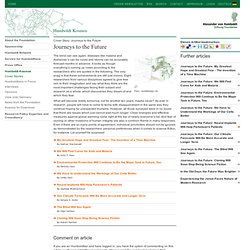
It looks as though everything’s coming up roses according to the researchers who are quoted in the following. The only snag is that these achievements are still just visions. Eight researchers from various disciplines agreed to give free rein to their imagination and say what they think are the most important challenges facing their subject and research as a whole; which discoveries they dream of and which they fear. What will become reality tomorrow, not for another ten years, maybe never? If you are an Humboldtian and have logged in, you have the option of commenting on this article or other Humboldtians' comments. Comment guidelines. VALUE Rubrics. Pyramids, pyramyths and pyramidiots. Open Textbook Catalog - Student PIRGs. Make Your Own Lunch.